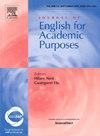The dynamics of building academic writing knowledge in interaction
IF 3.4
1区 文学
Q1 EDUCATION & EDUCATIONAL RESEARCH
引用次数: 0
Abstract
Becoming expert academic writers requires students to develop understanding, awareness and skills with regards to discipline-specific discourses. To develop such knowledge, talk around drafts is essential. Various studies traced how students develop knowledge about and of academic writing, but few explored how such knowledge is invoked and developed in interaction. The study therefore investigates the dynamics of introducing and using academic writing knowledge when tackling writing issues in interaction. The interaction is situated in a facilitated writing group – an important yet under-researched arena for talk around text. The data consist of video-recordings of group meetings with six postgraduate students who use English as an additional language, collected over 8 weeks at a Swedish university. To investigate how knowledge was introduced and used in the group, the study takes a socio-cultural perspective and applies the Vygotskian notion of cultural tools combined with discourse analytic approaches. The analysis shows how students draw on complex techniques to negotiate academic writing knowledge. Their interactional text work oscillates between abstract norms and concrete texts. Concepts of academic writing (e.g. research aim) are partly unpacked frontstage in the group, and partly backstage in individual notes. The results call for extending genre-pedagogic approaches of learning by discovery.
在互动中建立学术写作知识的动态
成为专业的学术作家需要学生培养对学科特定话语的理解、意识和技能。要发展这样的知识,围绕草稿进行讨论是必不可少的。各种各样的研究都追踪了学生是如何发展学术写作知识的,但很少有人探索这些知识是如何在互动中被调用和发展的。因此,本研究探讨了在处理互动写作问题时引入和使用学术写作知识的动态。这种互动是在一个便利的写作小组中进行的——这是一个围绕文本进行讨论的重要但尚未得到充分研究的领域。这些数据包括在瑞典一所大学8周内收集的6名以英语为额外语言的研究生小组会议的视频记录。为了研究知识是如何在群体中被引入和使用的,本研究采取了社会文化的视角,并将维果茨基的文化工具概念与话语分析方法相结合。分析显示了学生如何利用复杂的技巧来谈判学术写作知识。他们的互动文本工作在抽象规范和具体文本之间摇摆。学术写作的概念(例如研究目标)一部分在小组的前台,一部分在个人笔记的后台。研究结果呼吁扩展发现式学习的体裁教学法。
本文章由计算机程序翻译,如有差异,请以英文原文为准。
求助全文
约1分钟内获得全文
求助全文
来源期刊

Journal of English for Academic Purposes
Multiple-
CiteScore
6.60
自引率
13.30%
发文量
81
审稿时长
57 days
期刊介绍:
The Journal of English for Academic Purposes provides a forum for the dissemination of information and views which enables practitioners of and researchers in EAP to keep current with developments in their field and to contribute to its continued updating. JEAP publishes articles, book reviews, conference reports, and academic exchanges in the linguistic, sociolinguistic and psycholinguistic description of English as it occurs in the contexts of academic study and scholarly exchange itself.
 求助内容:
求助内容: 应助结果提醒方式:
应助结果提醒方式:


